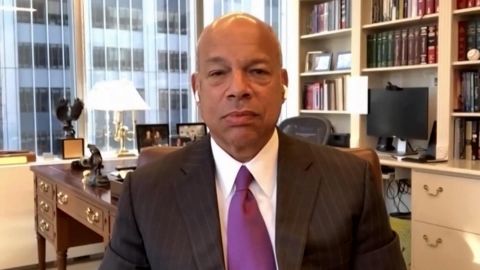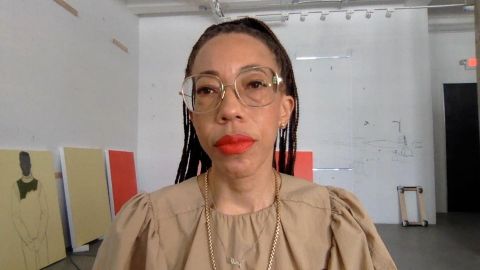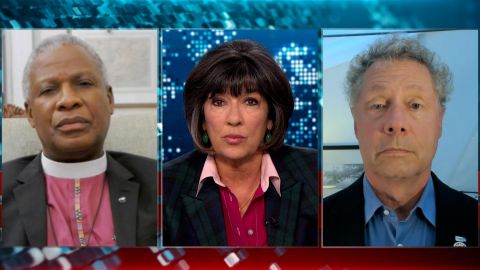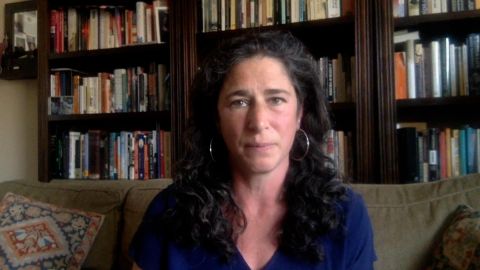Read Transcript EXPAND
CHRISTIANE AMANPOUR: Now, this week, the Department of Homeland Security announced that it will be conducting an internal review to root out white supremacy and extremism within federal agency — agencies. Jeh Johnson was the Pentagon’s chief legal officer. And he then served as secretary of homeland security under President Obama. And now he tells Walter Isaacson, what lurks in the shadows.
(BEGIN VIDEOTAPE)
WALTER ISAACSON: Thank you, Christiane. And, Jeh Johnson, welcome to the show.
JEH JOHNSON, FORMER U.S. SECRETARY OF HOMELAND SECURITY: Walt, thanks for having me back again. Look forward to our conversation.
ISAACSON: Ten years ago this weekend was the raid on Osama bin Laden. That was the security threat at that time. Tell me, what role did you play? And how do you see that now transforming the type of security threats we face?
JOHNSON: May 1, 2011, I was general counsel of the Department of Defense. I was the senior legal official for the Department of Defense involved in the consideration of the legal issues that went into the planning of that very sensitive operation. May 1, 2011, was probably my single best day in public service, because we got bin Laden. I’m a New Yorker. Twenty years ago, on 9/11, I was in this law firm in my private life, the same firm I’m with now on the other corner of this building and I saw everything that happened on 9/11. So, May 1, 2011 was a sense of closure for me like it was for a will the of other Americans. And I’m proud that I had a small part in that. The threat to our Homeland Security over the last 10 years has evolved significantly. We took the fight to oversees groups like the Al-Qaeda and the Islamic State. We addressed foreign directed terrorist attacks to the point where, in my judgment, Al-Qaeda, the Islamic State, could no longer launch large scale attack on our country like a 9/11. We went from there to what we referred to as foreign inspired attacks where a lone wolf actor here in the U.S. is inspired by something they see on internet to now domestic based terrorist attacks by violent rightwing extremists as it’s documented by the ADL and other groups. So, over the last 10 years since the Bid Laden operation or the threats to our homeland have evolved significantly from a foreign terrorist organization like ISIS to now a domestic based threat of the type we’ve been discussing, violent rightwing extremists like El Paso, like Charleston, I put Charleston in that category, and a series of other. The attacks on mosques, on synagogues, on black churches. The ADL was been tracking this for years and they will tell you that that now was the principal terrorist threat to our homeland. Beyond the terrorist threat, the number one Homeland Security, the immediate threat right now is, of course, COVID. And we’re addressing that. The people are getting vaccinated. The trendlines are, for the most part, in the right direction. Longer-term, it’s my view, Walter, that the number one Homeland Security threat to our nation is global warming, climate change, wildfires in California, drought, famine internationally, eroding coastlines, the severe weather events that threaten aging infrastructure. And we’ve got a lot of that here in the New York City area. That, in my judgment, is the number one threat to our Homeland Security. And I’m pleased that the Biden administration is stepping up to taking a leadership role. That’s where the United States should be now in addressing carbon emissions.
ISAACSON: You rarely talk about your role that day 10 years ago in the raid that killed Osama Bin Laden. Exactly where were you?
JOHNSON: I was in the command center in the basement of the Pentagon that day. You know, I remember that not like it was 10 years ago, but like it was maybe 10 hours ago. It was Sunday. I was very apprehensive and nervous like a lot of other people. I got up very early and went out to the flower shop, the garden shop that morning, planted a whole bunch of pansies in my yard in Georgetown. Then put on a sport coat and went to work. I told my family I have to go to work today. I’ll be back later. And I sat there and listened to and watched the whole operation from the basement of the Pentagon. I took detailed notes which are now classified. I’ll never see again. I’ll never forget my entry. I think it was around 3:00. Geronimo, Geronimo, which that our special forces had found him and got him.
ISAACSON: President Biden is looking at extremists at around the Armed Services and the police, even in parts of your former Department of Homeland Security because there was a high proportion of people who were part of the January 6th insurrection, who were part of law enforcement in the military. Tell me how you — why that is and how you would settle that problem.
JOHNSON: It’s a worthwhile inquiry. From what I understand, the announcement the other day, there was no special episode among DHS personnel. No specific individual who was arrested or anything of that nature acting out on DHS headquarters or something like that. But we do know that a number of the insurrectionists on January 6th were former members of the military, maybe a few in law enforcement. And so, it’s a worthwhile inquiry to undertake. DHS the largest collection of civilian gun carriers in the federal government larger than the Department of Justice includes border patrol, customs, air and marine, the coast guard, Homeland Security investigation. So, this is a worthwhile inquiry. But the other thing I want to say in response to your question. Walter there is a very interesting study out of the University of Chicago by a professor Robert Pape, you may have heard of it, that studies the demographics of those who were converging on the Capitol on January 6th. It shows that a number of them were from blue states, a number of them were from diverse cities, diverse states and their number one fear and concern was the so-called great replacement that somehow white members of our society were going to be replaced by people of color. That plus the false belief that somehow the election was stolen with the principal drivers of this, that it’s worth further study. But I do believe that the announcement from DHS was wholly warranted.
ISAACSON: You talk about white replacement theory, that seems somewhat prevalent among people in the Border Patrol. In fact, in Facebook, people in the Border Patrol have said racist things about even Hispanic members of Congress. What can be done about that?
JOHNSON: Well, we don’t want to stifle free speech, but there is a point where a Facebook posting, even in your private off hours’ capacity, can so degrade and undermine your employer’s integrity and mission and credibility, that action can be taken. Their decisions in our courts, for example, that say that, sure everybody has a First Amendment right, but if you say an employee of a public agency, specifically a law enforcement agency, there are some limits to what you should be saying. And when I was secretary. I got to know dozens and dozens of members of the of the Border Patrol, DHS personnel postings like that in my experience are not reflective of the larger attitude within the DHS.
ISAACSON: Do you think that the Department of Homeland Security and the government should monitor the social media of like the Secret Service, the Border Patrol, the Immigration Service? And should it even monitor the encrypted messages like encrypted message services?
JOHNSON: That’s a good question. When we say monitor, that might, to some, imply surveillance. But in many respects, Facebook postings, Instagram are public. And if I were a member of law enforcement, I remember the Secret Service, and I had a link to where I had friended somebody else in a Secret Service, and I see them posting things that are that are ugly that are extremist, I would probably feel as though we have an obligation to report that to a superior. But, you know, we struggle with this as employers, we struggle with this as leaders of government agencies, how far do you go in measuring the social media, the social media conversations of those who work for us. And in this age, I think it is a worthwhile inquiry. There are always limits, there are privacy limits, but I do believe it’s a worthwhile inquiry as you apply for a job and why you have a job.
ISAACSON: You have said that the border immigration problem, the illegal immigration problem has a certain tug to it, which is the more a president sounds receptive to having people come to this country, the more people try to get across the border. How do you break that dynamic and do you see that as being a problem right now with what’s happening on our southern border?
JOHNSON: Walter, I have to say, I have been away from this problem for five years and the further you get away from it, the easier the solutions seem to become. This was a difficult problem. I own the southern border issue for three years when I was secretary of Homeland Security. The simple fact is this, under the current conditions, in the current environment in Central America, this is a one-dimensional problem. The more receptive we sound in our immigration policy here in this country, the more the smugglers use that to recruit migrants to come to the United States. There is a push and a pull factor, without a doubt. And so, achieving the right balance between promoting our values, being fair, humane in our immigration policy but also enforcing our immigration laws is delicate, without a doubt. When we had the spike in 2014, I felt obliged to send an unequivocal message, do not come here illegally. You just simply have to send that message. Americans want border security, they want us to treat the dreamer’s, for example, fair, they want us to reform our broken immigration system but we want a secure border. So, it’s incumbent upon whoever is in power, whichever administration is in power to send a very straightforward unequivocal message to people south of the border that there’s a right way and a wrong way to come to our country. And if you come here illegally — everyone has a right to claim asylum, but if you come here illegally, we will send you back. Now, I’ve had some — when I was in office, I had some very awkward moments. I went to Guatemala. I literally stood next to the president of Guatemala in a press conference and said to his people, don’t come to my country. It’s a little awkward. But we have to send that very straightforward message. Otherwise, the coyotes, the smugglers will distort a muddled message and encourage people to come. There are like used car dealers, with all due respect, they use car dealers, that say you got to go now. There’s a discount. You got to go by the end of the month. And there’s this feeding frenzy that leads to large numbers like the ones we’re seeing now.
ISAACSON: Do you think that the perception of chaos or the perception some people who call it a crisis on the southern border, whether it’s real or just proceed, feeds into the white nationalist extremism?
JOHNSON: Yes, I do. This is a Republican talking point. They — Republicans like to talk about the border. They like to talk about a border out of control and it feeds anxiety. It’s important to understand the facts of illegal migration. And I don’t — I won’t beat around the bush. I think the answer to your question is yes.
ISAACSON: If you could have a wave of wand and change some policies to help with the border issue, which policies would you do irrespective of the politics of getting them passed?
JOHNSON: Well, it’s actually not as difficult as waving a magic wand. There are solutions to this. They might be politically unattainable in this environment, but there are solutions. The simple fact is this, Walter, as long as Central America is in the state it’s in, which is one of the most violent regions of our planet, the push factors for illegal migration will always overwhelm whatever defenses you can put up on the southern border. People are making the very basic decision to flee a burning building in Central America, send their children up here, even if it’s only for a couple of years while their deportation proceeding their asylum application is pending. And so, making an investment in addressing the poverty, addressing the corruption, addressing the violence is the way forward. We began that in 2016 with an investment of $750 million. And border security experts will tell you that that drop in the bucket was beginning to make a difference. I know Joe Biden believes this because when he was vice president and I was secretary we had conversations about this. He spent a lot of time in himself in Central America addressing this issue. And long-term, that is the solution to this problem, you have to address the push factors.
ISAACSON: Do you think that the conviction of Derek Chauvin a week or so ago can help us to get to a better place both on policing practices and maybe even the larger issue of race?
JOHNSON: Two thoughts. One, I’m proud of our court system. Our democracy right now is challenged, it’s under stressed. But through it all, I think the courts have remained a forum for truth and justice. I was very impressed by that Derek Chauvin jury’s methodical approach to the issues, they reached a verdict in 10 hours, but it’s apparent that they were very careful. The other thing that occurs to me, every time I think about the Derek Chauvin prosecution, Walter, suppose it had been no camera, the initial police report said something like, had, you know, a health condition when in distress while he was handcuffed and died. If there had been no camera, I suspect there would have been no prosecution, wouldn’t have been an indictment, would have been of something tucked in a file and forgotten. As many people know, excessive force, lethal force, unwarranted lethal force by the police is not new. What is new is that it’s being filmed now and it’s being filmed on a regular basis. And so, there are answers to this this problem, but it’s a phenomenon that is occurring, we see it occurring on a regular basis. Not because it’s new but because the filming of it is new.
ISAACSON: Secretary Jeh Johnson, thank you so much for joining us.
JOHNSON: Thank you.
About This Episode EXPAND
Thabo Makgoba and Seth Berkley; Rebecca Traister; Jeh Johnson; Amy Sherald
LEARN MORE



